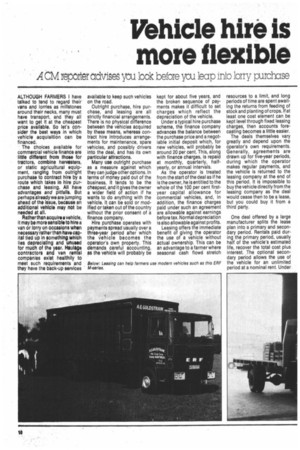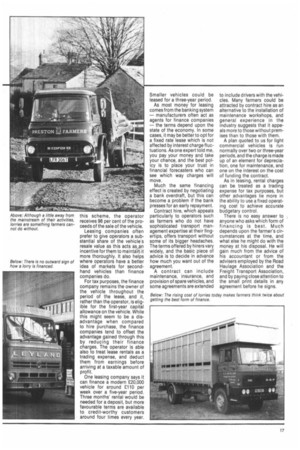Vehicle hire is more flexible
Page 132

Page 133

If you've noticed an error in this article please click here to report it so we can fix it.
A CV rEoorter advises you look before you leap into lorry purchase
ALTHOUGH FARMERS I have talked to tend to regard their vans and lorries as millstones around their necks, many must have transport, and they all want to get it at the cheapest price available. So let's consider the best ways in which vehicle acquisition can be financed.
The choices available for commercial vehicle finance are little different from those for tractors, combine harvesters, or static agricultural equipment, ranging from outright purchase to contract hire by a route which takes in hire purchase and leasing. All have advantages and pitfalls. But perhaps already we are jumping ahead of the issue, because an additional vehicle may not be needed at all.
Rather than acquire& vehicle, it may be more sensible to hire a van or lorry on occasions when necessary rather than have capital tied up in something which lies depreciating and unused for much of the year. Haulage contractors and van rental companies exist healthily to meet such requirements and they have the back-up services
available to keep such vehicles on the road.
Outright purchase, hire purchase, and leasing are all strictly financial arrangements. There is no physical difference between the vehicles acquired by these means, whereas contract hire introduces arrangements for maintenance, spare vehicles, and possibly drivers into the deal, and has its own particular attractions.
Many use outright purchase as a measure against which they can judge other options. In terms of money paid out of the business, it tends to be the cheapest, and it gives the owner a wider field of action if he wants to do anything with the vehicle. It can be sold or modified or taken out of the country without the prior consent of a finance company.
Hire purchase operates with payments spread usually over a three-year period after which the vehicle becomes the operator's own property. This demands careful accounting, as the vehicle will probably be
kept for about five years, and the broken sequence of payments makes it difficult to set charges which reflect the depreciation of the vehicle.
Under a typical hire purchase scheme, the finance company advances the balance between the purchase price and a negotiable initial deposit which, for new vehicles, will probably be around 20 per cent. This, along with finance charges, is repaid at monthly, quarterly, halfyearly, or annual intervals.
As the operator is treated from the start of the deal as if he is the owner, he is entitled to the whole of the 100 per cent firstyear capital allowance for commercial vehicles, and, in addition, the finance charges paid under such an agreement are allowable against earnings before tax. Normal depreciation is also allowable against profits.
Leasing offers the immediate benefit of giving the operator the use of a vehicle without actual ownership. This can be an advantage to a farmer where seasonal cash flows stretch resources to a limit, and long periods of time are spent awaiting the returns from feeding of stock and planting of crops. If at least one cost element can be kept level through fixed leasing charges, then accounts forecasting becomes a little easier.
The deals themselves vary greatly and depend upon the operator's own requirements. Generally, agreements are drawn up for five-year periods, during which the operator makes regular payments, and the vehicle is returned to the leasing company at the end of this period. It is impossible to buy the vehicle directly from the leasing company as the deal would cease then to be a lease, but you could buy it from a third party.
One deal offered by a large manufacturer splits the lease plan into a primary and secondary period. Rentals paid during the primary period, usually half of the vehicle's estimated life, recover the total cost plus interest. The optional secondary period allows the use of the vehicle for an unlimited period at a nominal rent. Under this scheme, the operator receives 98 per cent of the proceeds of the sale of the vehicle.
Leasing companies often prefer to give operators a substantial share of the vehicle's resale value as this acts as,fan incentive for them to maintain it more thoroughly. It also helps where operators have a better idea of markets for secondhand vehicles than finance companies do.
For tax purposes, the finance company remains the owner of the vehicle throughout the period of the lease, and it, rather than the operator, is eligible for the first-year capital allowance on the vehicle. While this might seem to be a disadvantage when compared to hire purchase, the finance companies tend to offset the advantage gained through this by reducing their finance charges. The operator is able also to treat lease rentals as a trading expense, and deduct them from earnings before arriving at a taxable amount of profit.
One leasing company says it can finance a modern £20,000 vehicle for around £110 per week over a five-year period. Three months rental would be needed for a deposit, but more favourable terms are available to credit-worthy customers around four times every year. Smaller vehicles could be leased for a three-year period.
As most money for leasing comes from the banking system — manufacturers often act as agents for finance companies — the terms depend upon the state of the economy. In some cases, it may be better to opt for a fixed rate lease which is not affected by interest charge fluctuations. As one expert told me, you pay your money and take your chance, and the best policy is to place your trust in financial forecasters who can see which way charges will move.
Much the same financing effect is created by negotiating a bank overdraft, but this can become a problem if the bank presses for an early repayment.
Contract hire, which appeals particularly to operators such as farmers who do not have sophisticated transport management expertise at their fingertips, offers transport without some of its bigger headaches. The terms offered by hirers vary widely, and the basic piece of advice is to decide in advance how much you want out of the agreement.
A contract can include maintenance, insurance, and provision of spare vehicles, and some agreements are extended
to include drivers with the vehicles. Many farmers could be attracted by contract hire as an alternative to the installation of maintenance workshops, and general experience in the industry suggests that it appeals more to those without premises than to those with them.
A plan quoted to us for light commercial vehicles is run normally over two or three-year periods, and the charge is made up of an element for depreciation, one for maintenance, and one on the interest on the cost of funding the contract.
As in leasing, rental charges can be treated as a trading expense for tax purposes, but other advantages lie more in the ability to use a fixed operating cost to achieve accurate budgetary control.
There is no easy answer to anyone who asks which form of financing is best. Much depends upon the farmer's circumstances at the time, and what else he might do with the money at his disposal. He will gain much from the advice of his accountant or from the advisers employed by the Road Haulage Association and the Freight Transport Association, and by paying close attention to the small print details in any agreement before he signs.




























































































































































